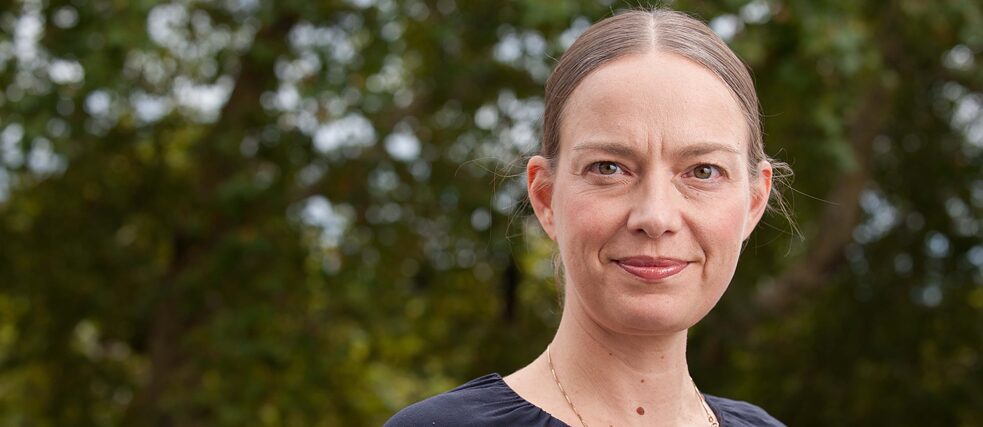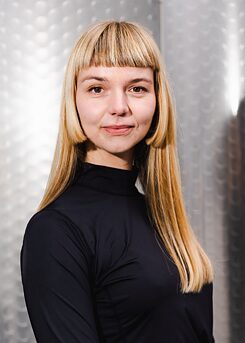Goethe Annual Lecture by Mercedes Bunz
We were delighted to have art historian, philosopher and journalist Mercedes Bunz as one of the speakers of our Goethe Annual Lecture series at the Goethe-Institut London in November 2022. Her talk explored the particular power of AI systems using work from contemporary artists to reveal the human misunderstanding regarding AI.
The talk was moderated by Eva Jäger, curator of Arts Technologies at Serpentine Galleries.
As part of the Goethe-Institut London's 60th anniversary celebrations, we hosted three Goethe Annual Lectures in 2022 featuring author Mithu Sanyal, academic Mercedes Bunz and musician Matthew Herbert.
In her talk, Mercedes Bunz dug into the ways contemporary AI systems ‘calculate meaning’ - a field traditionally assigned to culture. She explored ways in which AI systems analyse our world, and could transform our culture by assisting us with their intelligence – albeit not human intelligence.
Using work from contemporary artists and researchers such as Memo Atken, Rafik Anadol, Stephanie Dinkins, Adam Harvey, and Allison Parrish, the talk discussed not only how artists can help us in understanding the particular power of AI systems, but also how AI systems make sense of our world and symbols. At the same time, these playful, curious, and sometimes critical artistic approaches toward AI point to something else according to Mercedes Bunz: a profound human misunderstanding of the culture of AI.
Mercedes Bunz is a professor in Digital Culture and Society at the Department of Digital Humanities, King's College London. She studied Philosophy, Art History, and Media Studies at the FU Berlin and the Bauhaus University Weimar, and wrote her thesis on ‘The history of the internet-driven by a deep curiosity about digital technology'. Until today, she has not been disappointed by the transforming field that is digital technology, which provides her reliably with new aspects to think constantly about.
At the moment, that is Artificial Intelligence and ‘machine learning’. Delving into the topics of AI and ‘machine learning’, Bunz co-leads the Creative AI Lab, a collaboration with the Serpentine Gallery, London. Her latest publications are 'How Not to Be Governed Like That by Our Digital Technologies' in The Ends of Critique: Methods, Institutions, Politics, edited by K. Thiele, B. Kaiser, T. O’Leary (Rowman & Littlefield) and with Claudia Aradau 'Dismantling the apparatus of domination? Left critiques of AI' in Radical Philosophy.
Eva Jäger is Curator of Arts Technologies at Serpentine. She commissions artists working with advanced technologies and produces the work alongside their teams, designing novel approaches and philosophies of new tech. The foundation of the Arts Technologies programme is located in an evolving R&D Platform that supports the development of infrastructures for ongoing artistic exploration and interrogation of advanced and emerging technologies through strategic briefings and a number of labs. Eva is co-investigator of the Creative AI lab, which operates between the R&D Platform and and King’s College London's Digital Humanities Department, along with Dr Mercedes Bunz. Eva has her own creative practice, working as one half of Legrand Jäger, a design studio researching applications of computation/information/analysis/predictive technologies.
Past speakers of our Annual Lecture include Dan Hicks (2021), Sharon Dodua Otoo (2020), John Kampfner (2019), Brendan Simms (2018), Anne McElvoy (2017), Neil MacGregor (2016), Christopher Clark (2014), David Chipperfield (2012), Norman Rosenthal (2010), Tacita Dean (2006), Peter Jonas (2005), Ian Kershaw (2003), Richard Wentworth (2002) and AS Byatt (2001).
Here you can find videos of previous lectures.

